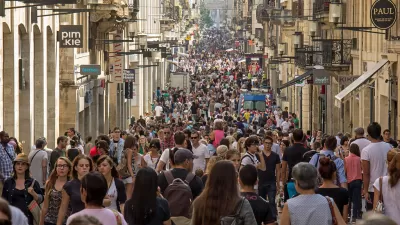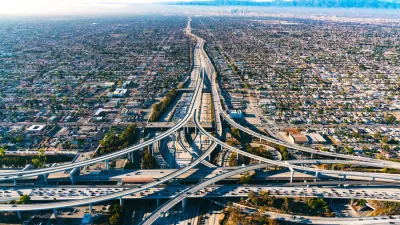Sprawl leads to more emissions, but the economic costs are also high. Policies and strategies that ensure compact growth are essential.

Catlyne Haddaoui considers the implications of an August 2018 report from The New Climate Economy that says more sustainable, compact urban development will lead to global economic savings of up to $17 trillion by 2050. “Compact cities produce fewer emissions because they tend to offer better access to public transit and cycling and walking paths, have greater energy efficiency, have lower environmental costs for infrastructure, and allow for more green spaces.”
She reports that infrastructure is less costly to build and maintain in compact cities, and residents in these cities do not have to travel as far or deal with congestion and air pollution, which then boosts GDP. In addition, says Haddaoui, compact cities bring people together, spur innovation, and increase productivity.
Strategies for compact growth need to stop sprawl, which promotes auto dependence, single-family homes, and low-density development. Haddaoui says shifting people from driving to sustainable modes of travel is crucial, and this change will happen through transportation infrastructure investments.
She adds that these investments need to be coupled with national policies that further support compact development. “Governments will need to reform spatial plans, building codes and tax incentives to discourage sprawl. And they’ll need to do this while avoiding the displacement of low-income or other marginalized urban residents as inner-city areas become more attractive,” says Haddaoui.
FULL STORY: Cities Can Save $17 Trillion by Preventing Urban Sprawl

Alabama: Trump Terminates Settlements for Black Communities Harmed By Raw Sewage
Trump deemed the landmark civil rights agreement “illegal DEI and environmental justice policy.”

Study: Maui’s Plan to Convert Vacation Rentals to Long-Term Housing Could Cause Nearly $1 Billion Economic Loss
The plan would reduce visitor accommodation by 25% resulting in 1,900 jobs lost.

Planetizen Federal Action Tracker
A weekly monitor of how Trump’s orders and actions are impacting planners and planning in America.

Waymo Gets Permission to Map SF’s Market Street
If allowed to operate on the traffic-restricted street, Waymo’s autonomous taxis would have a leg up over ride-hailing competitors — and counter the city’s efforts to grow bike and pedestrian on the thoroughfare.

Parklet Symposium Highlights the Success of Shared Spaces
Parklets got a boost during the Covid-19 pandemic, when the concept was translated to outdoor dining programs that offered restaurants a lifeline during the shutdown.

Federal Homelessness Agency Places Entire Staff on Leave
The U.S. Interagency Council on Homelessness is the only federal agency dedicated to preventing and ending homelessness.
Urban Design for Planners 1: Software Tools
This six-course series explores essential urban design concepts using open source software and equips planners with the tools they need to participate fully in the urban design process.
Planning for Universal Design
Learn the tools for implementing Universal Design in planning regulations.
Caltrans
Smith Gee Studio
Institute for Housing and Urban Development Studies (IHS)
City of Grandview
Harvard GSD Executive Education
Toledo-Lucas County Plan Commissions
Salt Lake City
NYU Wagner Graduate School of Public Service





























